MangaReview: (AoT) Death, Depression, and Despair — The Salvation from Being Alive
One dies only because he is once alive.
Spoiler Alert until Chapter 138.
I will also talk about A Song of Ice and Fire (Games of Thrones as its TV series adaptation), you can avoid the spoiler by skipping the “Spoiler” part.
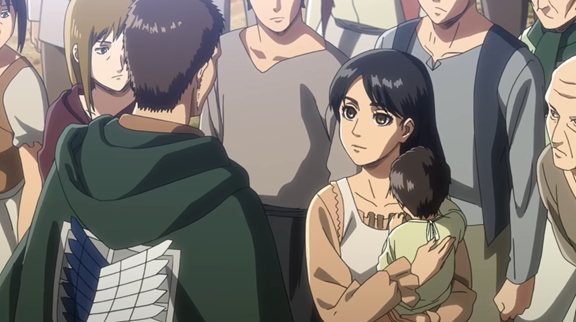
I come up with this article after reading 諫山創《進擊的巨人》:所有的政治一開始都是去追尋自由,但在最後是去學會背負犧牲 — 文學的實驗室 — Medium. This inspires me a lot.
Death plays a definitely important role in Attack on Titan. Similar with the classic mangas for boys, the main characters always need to risk their lives fighting against their enemies, and the main characters generally are not expected to die no matter how strong their enemy is. However, the characters in AoT die so easily that it reminds me of A Song if Ice and Fire (Games of Thrones as its TV series adaptation). In A Song of Ice and Fire, (Spoiler→)when you are about to see someone as the main character, he will somehow die in the next chapter, and it will turn to the perspective from another character whom you might consider the villain (←Spoiler). In AoT, you will still be able to recognize the main characters, Eren, Mikasa, and Armin, but any other character can easily die all of a sudden. This is what makes it different from the classic mangas in the beginning, but also one of the reasons why it went viral.
The Death Scenes
There are plenty of death scenes. Although it becomes quite common as the story progresses, it is still hard to get used to it especially when one begins to love a specific character. I will try to briefly discuss all of the death scenes I remember in the whole story, and you can simply skip it if you have already familiar with the plot.
The first scene lies in That Day (その日), Ch. 2, in which Eren’s mother, Carla, is eaten alive in front of him. This scene is impressive, and implies the darkness, brutality, and depression of the whole story. However, the first scene which shocks me is in First Battle (初陣), Ch. 4, when Eren’s comrades die so easily and that Eren got eaten alive. Well, we all know that Eren does not really die, but this is still so stunning that I began to feel highly interested and decided to finish it until the latest chapter. This is also the first time I feel the real weight of risking one’s life in this work. This is followed by the death of Franz while his girlfriend Hannah is trying to revive his mutilated body with CPR, in A Dull Glow in the Midst of Despair (絶望の中で鈍く光る), Ch. 5.
In the battle to retake Trost District, Eren goes berserk and acts like a normal titan, and the members of the elite team are in a dispute about aborting the plan or not. Although others are asking to give up the plan, Ian Dietrich, the leader of the elite team, orders everyone to protect Eren even if it would cause a great casualty. He is however eaten alive by a titan during the operation.
As illustrated in Primitive Desire (原初的欲求), Ch. 14, anyone is free after being born to the world, so it does not need any reason to fight for your own freedom. However, this price is too high so one might not be happy even if he in the end wins himself freedom.
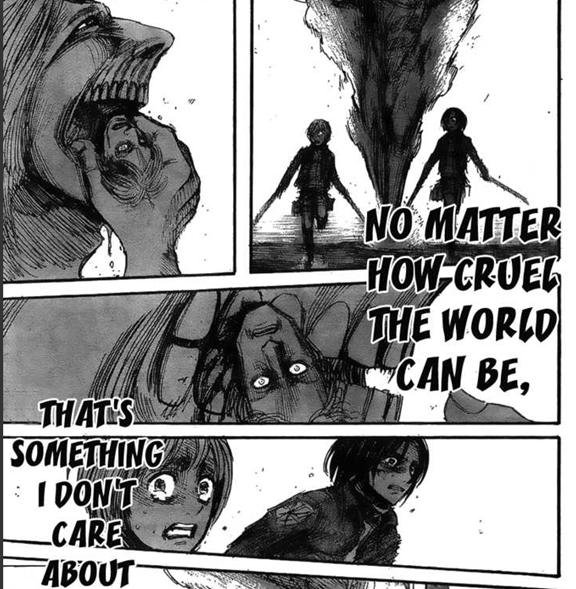
The next scene appears in the Female Titan arc, with the death of a great amount of normal soldiers and the death of the members of the special operation squad. Different from the Trost arc, the plan to capture the Female Titan completely fails, with the price of numerous soldiers and those valued by Levi and Eren, including Petra. The anime adaptation even makes a scene for Petra’s corpse being forsaken in front of Levi.
As Armin argues in Erwin Smith (エルヴィン・スミス), Ch. 27, there are people superior than others in abandoning important things if necessary. However, this does not follow that you will get what you expect, and you will even lose everything just like the battle against the female titan. This is also the first time I realize that, in this work, the characters will simply die even if the author make them seem like the important support characters.

After that, I kind of feel relieved instead because I finally know how hopeless it is. For example, we can see some members of the survey corpse being twisted around the little finger of the beast titan, during the Clash of the Titans arc. After that it costs yet another great amount of people’s lives including Hannes to save Eren from being taken away by Reiner and Bertolt. Erwin even loses his right arm. Hannes in the end fails to avenge Eren’s mother and is ironically eaten alive by the same titan, right in front of Eren and Mikasa. They successfully return just because Eren accidentally activates the power of the founding titan.
After the Royal Government arc, we meet probably the worst battle which causes the death of Erwin Smith. This is the battle to retake Wall Maria, and only nine members of the survey corpse survive it. However, the speech by Erwin before leading the suicidal charge could be seen as the best interpretation of death and hope. This inspires me a lot.
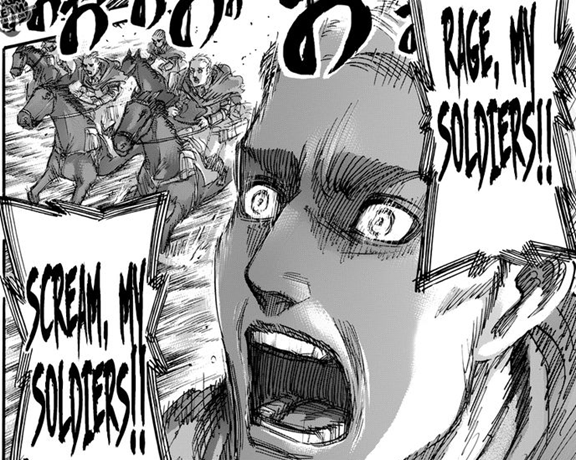
Everything gets messed up in the Marley arc, the surprise attack against Marley kills tons of people including Sasha. Almost all of the members of the corpse other than the survey corpse are turned into titans and get killed after drinking the wine with Zeke’s spinal fluid. The Rumbling later is used to destroy the whole world. Hange, Flock, and other support characters die one by one during the battle against Eren. In the latest chapter, A Long Dream (長い夢), Ch. 138, Jean, Connie, and Gabi are turned into titans. Annie’s father, Reiner’s mother, and Falco’s parents also become titans just right before their reunion. Well, this literally breaks my heart even after I think I have got used to the cruelty of AoT.
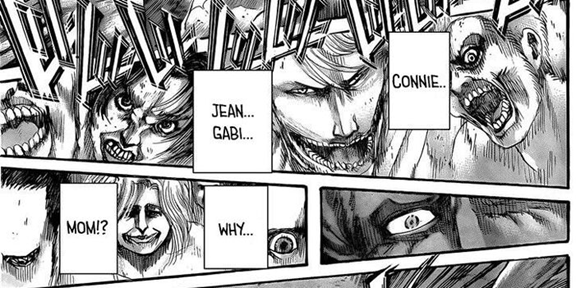
Death, Depression, and Despair
In my opinion, AoT succeeds in illustrating the depression and even despair with its brutal, dark, and hopeless plot. It never stops trying to tell us how cruel the world could be, and one of the most impressive things is the illustration of death. In what follows, I will try to analyze how Isayama makes use of these death scenes.
Sudden Death
The first thing I want to talk about is the sudden death. When it comes to the death in AoT, that everyone can die all of a sudden is what shock me in the beginning. As mentioned above, this reminds me of A Song of Ice and Fire.
The scenes of sudden death include the death of Eren’s squad in his first battle, Levi’s squad against the female titan, Sasha’s death, and Jean, Connie, and Gabi being turned into pure titans (not sure what will happen since currently the latest chapter is 138).
These scenes share the same feature that the readers probably don’t expect such death and will get shocked for certain. However, these scenes often come with some hope in the beginning, which makes themselves even more devastating. For example, Eren’s first battle seems so promising as they even talk about their future position in the corpse, right before Thomas being eaten alive. For Levi’s squad, Eren makes a choice to trust them because he does not want to feel alone anymore, and he seems to successfully build a great relationship with his superiors when Eld even tells him about the skeleton in Petra’s and Oluo’s closet, right before the female titan savagely kills them all. Sasha gets shot right after Connie says that Jean and Sasha are more special to him. Jean, Connie, Reiner’s mother, and Annie’s father are all turned into titans right after the rumbling seems to be stopped successfully and Annie finally sees her father.
For all of these, you have to admit that Isayama is really good at torturing his readers, by giving you some hope right before pushing you down to the hell. The sudden death shows exactly what Erwin argues in his final speech, that death is the same for anyone no matter what kinds of life he lives. Death is equal to anyone, but this equality is also what makes it so cruel and hopeless.

Hopeless Death
If the sudden death shows how easily people can die, the hopeless death shows how inevitable it could be, which makes it hopeless since it feels impossible to avoid such ending. In my opinion, this kind of death scenes occur in the battle of Trost District arc when the elite garrison tries to help Eren block the hole, Clash of the Titan arc when Mike’s squad fights the beast titan, the battle to retake Wall Maria when Erwin leads to the suicide charge, and the death of Petra and Hannes.
All of these scenes consist of a hopeless and endless battle, while it feels like there is someone making fun of those who struggle for survival. Ian argues against Rico that the best they can do is to struggle and as brave as the can, like a tragedy. Mike’s squad consists of people full of courage and skill, but no one can fight an endless battle. Gelgar even finds an empty bottle which he considers his last chance to drink alcohol. This kind of jokes feel more awful when we see Levi realizing Petra’s feeling after her death. For Hannes, he finally finds a chance to avenge Eren’s mother and to protect Eren and Mikasa at the same time since this is what he could not, only to fail and get eaten alive by the same titan.
This hopeless emotion is also illustrated well by Floch before and after the suicide charge led by Erwin. Floch hysterically argues that there is no need for protecting the horses, since everyone is going to die. His is right in saying that most soldiers are there simply to die for nothing. More importantly, he has nothing but regrets during the charge, and he is probably right as well in telling Hitch that Marlowe should have been regretful before his death. This reminds me of the Eren’s first battle. Eren’s squad members got almost wiped out, right after sharing their dreams with one another. Did they regret before the death? Probably.
Isayama is not only good at torturing his readers, but also good at torturing his characters. This is apparent when it comes to Reiner, as I discuss in MangaReview: (AoT) From Reiner to Lannister, from Suicide to Freedom | by 哲學宅 Philosophy Otaku | Mar, 2021 | Medium. The characters fight for survival, but what lies in their future is the endless battle, and they die if they lose any of them. We can easily feel how hopeless it is, and there is no happiness even after winning any battle, because the price is always too high to take.
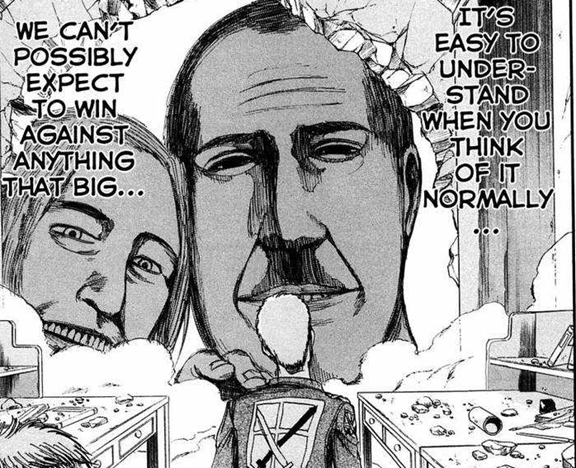
Random Death
Although people die easily in AoT, we have to admit that there are still some people as the main characters who don’t die. However, Isayama also keeps making it seem more plausible, and one way is to tell the readers that the Grim Reaper won’t choose its target. In most cases, death simply happens randomly.
These random death scenes happen in the battle for the Trost District, in which Ian as the more valuable soldier dies while Rico lives. The suicide charge led by Erwin also causes the death or Marlowe while Floch is alive. In the latest chapter so far, even if it is almost the end of such a long journey of battle, the ones who get turned into a titan are still picked randomly, from those who have no titan power.
Just as what Erwin presents in his final speech, death is equal to everyone no matter what kind of life one lives, and the main characters are just lucky to be alive. No one is promised tomorrow. This is also well illustrated in the debate of saving Armin or Erwin. Armin should have died in the first battle but is luckily saved by Eren, he is not killed by the female titan just because it’s Annie who knows him, and he gets yet another chance with the price of the commander’s life (For Erwin’s death, see MangaReview: (AoT)Why Levi Does Not Save Erwin | by 哲學宅 Philosophy Otaku | Medium). This is also how Isayama tells us how cruel the world could be. The equality of death is what makes lives tragic since we will keep seeing and wondering why some good people deserve such painful death.
Other’s Death
No matter how tragic one dies, there is only one chance for anyone to experience this. However, even if we never experience death ourselves, we still can experience the fear of seeing other’s death for many times. This is well illustrated when Daz collapses and tells Marco that he only feels thankful while seeing his comrades eaten alive by the titans because it is not him, in Response (応える), Ch. 11.
Daz cannot take it anymore because it will in the end be his turn to be eaten alive, and he is now alive only because he is luckier than others. Such feeling is understandable, but this is different from what I want to say here. Experiencing other’s death does not only tell you the possibility of anyone’s death, but also tell you the whole life of the dead.
The death of a person is not only the death of a human-being, but also the end of a story. Anyone is unique and cannot be replaced by any other, and thus one’s death means that we have forever lost the contact with such a unique individual.
AoT tells this idea many times. For example, in episode 11 of the anime adaptation, Rico tells Eren about this before carrying out the plan, that any name comes with a long story with many other people with flesh and blood. Eren’s mind is destroyed and asks Historia to eat himself because he considers himself the one who causes the death of many people, in Dreams and Curses (夢と呪い), Ch. 65. He still has a similar emotion as seeing Historia bravely taking her responsibility to become the queen, and condemns his weakness when he remembers the one dies for himself, in Ruler of the Walls (壁の王), Ch. 68.
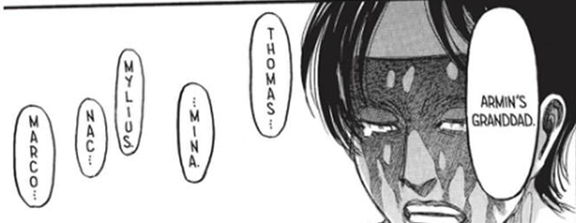
Another great example is Levi who really cares about his subordinates. In Mercy (慈悲), Ch. 32, after Levi’s squad got completely wiped out by the female titan, Eren notices that Levi is more talkative than ever, and this is because of his regret and loneliness. In Counterfeit (偽り者), Ch. 110, Levi emphasizes that it is Ragako instead of “that town” after listening to Zeke’s explanation. What Levi does here is to remind Zeke that what he destroyed was not an arbitrary town, but Ragako in which there are real people with different stories. Finally in Savagery (暴悪), Ch. 113, Levi is still asking if his subordinate is in the neck of the titans before killing them.
Isayama is good at illustrating the death of a person with a long story, to remind the readers that it is not just a character, it is a person like us with flesh and blood. It is however this illustration that makes it sad and depressed. It is also this kind of death that makes Eren lose track of himself in the Uprising arc, because he finally realizes that he is not special, but only somehow inherits the titan power while others don’t. During this arc, we may also feel the same that any dead soldier might be even more important than Eren for the future of humanity if there is no titan power, but it is Eren who is still alive, not these soldiers.

The Death for Nothing
In To You, 2,000 Years from Now (二千年後の君へ), Ch. 1, the defeated survey corpse meets a mother looking for his son, only to get the arm of her son returned. She then asks if the death of her son has any contribution to the future of humanity, but the commander cries and admits that it’s again all for nothing.
This is very impressive, and I think this part represents the core idea along the whole story. It is true that we don’t want to die, but it is also true that we seek for the meaning of death. It is more acceptable if death gives us something, and is the reason why sometimes we may give up lives for something more important, such as freedom. Well, this is in fact what keeps being asked in AoT, that what is the value of freedom and how much price you would pay for it.
What makes AoT dark and depressed is not only the death, but that people die for nothing. They simply die, and we get nothing in return. In What Should I Do Now? (今、何をすべきか), Ch. 18, it is the emotion of getting something in return which changes Jean in the end. In the Female Titan arc, the survey corpse sacrifices a great amount of soldiers, only to fail the mission of catching the female titan. Levi loses all his subordinates and is not even able to get Petra’s body back, in episode 22 of the anime adaptation. What makes it more sorrowful here is however not the death of the soldiers, but that they die for nothing. This is also what Erwin is asked by the people after the return. Another example is Floch who once argues against the main characters that even a nobody like him should have the right to know what he is going to die for, after the battle to retake Wall Maria.
On the other hand, sometimes even if the mission is succeeded, the price is too high that no one can take it. This has been mentioned before, such as the battle of Trost District, and the one for recapturing the Shiganshina District. This is one of the reasons why we never see any happiness even if there is a huge progress for the future of humanity.

The Meaning of Death
Let’s say, there are people who are willing to sacrifice themselves for some values like freedom. This deserve our respect without a doubt, but sacrifice itself won’t guarantee anything. One will never know what the sacrifice will earn in return. The only thing for certain is that you will get nothing if you sacrifice nothing. As a result, the only answer is to try and wait for the outcome, but in most cases, you will never know what role you play in the whole history.
This idea is first illustrated in the battle of Trost District, argued by Ian in the dispute of abandoning Eren or not. However, the most memorable should be Erwin’s final speech before leading the suicide charge. Before his final speech, Flock asks Erwin whether lives are meaningless if it will come to an end after all. Erwin then points out the idea, that the meaning of lives does not depend on yourself, but your follower and those who remember you. As a result, you should try your best to live for the glory of the dead, and leave the definition of meaning for the alive.
Erwin’s speech could be one of the best scenes in AoT, but it does not give Erwin himself more opportunities to live (For Erwin, see MangaReview: (AoT) Erwin Smith Could Have Become the Real Demon — the Berserk in Attack on Titan | by 哲學宅 Philosophy Otaku | Mar, 2021 | Medium). However, this does tell us an important idea about the meaning of death. The knowledges and ideas of human beings are not built by one person but across generations. It is like a long river while one only occupies a little part of it.
Erwin’s speech also turns the meaning of death into another level. From this perspective, one’s life does not belong to himself anymore but the dead. If you need to die, you must die for others instead of yourself. This is well illustrated when Eren chats with Falco in From One Hand to Another (手から手へ), Ch. 97, that “everyone is burdened by a certain “something”, and they plunge head-first into hell”. In other words, we are still seeking for the meaning of death, but it is not us who can define such meaning anymore. (For Eren, see MangaReview: (AoT) Eren’s Hell, Justifying His Genocide | by 哲學宅 Philosophy Otaku | Mar, 2021 | Medium)
The meaning of death depends on the followers. Although it is what Erwin argues for, the best example is Sasha’s death. I discuss why the meaning of her death is details in MangaReview: (AoT) Sasha and the Only Innocence | by 哲學宅 Philosophy Otaku | Jan, 2021 | Medium. For here, the follower who gives meaning of Sasha’s death is definitely Gabi. It is Sasha who in the end gives Gabi a chance to be free from Reiner’s tragic path, and she in the end realizes the truth and gets rid of her hatred. (For Gabi, see MangaReview: (AoT) Saving Gabi From the Dark Fate — What nation do you belong to? | by 哲學宅 Philosophy Otaku | Mar, 2021 | Medium)
Another great example is the death of Marco, whose meaning is defined by Jean. In Night of the End (終末の夜), Ch. 127, Hange reminds Jean of the burden from the dead, which is similar with the one before Erwin’s final speech with Levi. Jean becomes the one we know because of the death of Marco, and it is also Jean who gives the meaning of Marco’s death. (For Jean’s story, see MangaReview: (AoT) What Makes Jean Angry? — The Burden of History | by 哲學宅 Philosophy Otaku | Mar, 2021 | Medium)
On the other hand, Zeke comes up with a different idea considering the meaning of death. He argues that it is the best for Eldians not to be born to the world because of the inevitably hopeless lives. In other words, there will be no sorrowful death if there is no life. Is it a satisfactory answer? It is not according to Eren. We can see it in the battle of Trost District, Armin asks Eren why he wants to go outside the wall even there could exist only sorrow and agony. Eren then replies that “Because I was born to this world.”
This answer is exactly the core idea of how Eren thinks about life. Although he is once defeated and seeks for the salvation from death, as mentioned before when he asks Historia to eat him, it is his mother who reminds himself of the importance of existence, that it is already great enough to be born to the world, in Bystander(傍観者), Ch. 71. I believe many readers like me is more or less saved by this. It is the same for Eren, and also why in the end he chooses to destroy the world instead of taking Zeke’s euthanasia plan.
We can conclude that every discussion presupposes being alive. Nothing else comes before existence. Discussing the meaning of death is nothing more than discussing the meaning of life. After all, one dies only because he is once alive.
Manga Review: The Humanity in Attack on Titan (Part I)-Philosophy | by 哲學宅 Philosophy Otaku | Medium
Manga Review: The Humanity in Attack on Titan (Part II)-History | by 哲學宅 Philosophy Otaku | Medium
MangaReview: (AoT)Why Levi Does Not Save Erwin | by 哲學宅 Philosophy Otaku | Medium
MangaReview: (AoT) Sasha and the Only Innocence | by 哲學宅 Philosophy Otaku | Medium
MangaReview: (AoT) How to Love Yourself as Ymir Does | by 哲學宅 Philosophy Otaku | Apr, 2021 | Medium
